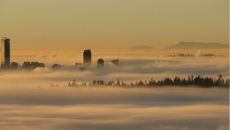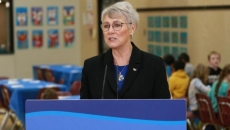Crowds from near and far, united in celestial anticipation, have started to gather along the Canadian path of the total solar eclipse.
The path of totality, where the sun goes directly behind the moon, will first cross through southwestern Ontario around 3:15 p.m. Monday and move east through Quebec and Atlantic Canada before exiting Newfoundland around 3:45 p.m. eastern time.
While parts of Ontario, Quebec and the Maritimes are shaping up for good views, the eclipse in B-C will only be partial, and clouds may get in the way.
Aaron Boley, an associate professor of physics and astronomy at the University of British Columbia, says the moon will cover about 28 per cent of the sun in Vancouver.
If the sun is covered by clouds, Boley says it may seem like a normal day -- but if the clouds break and reveal the sun at the time of the eclipse between 10:45 a-m and 12:15 p-m, he warns that people should use special protective glasses to look at the sun.
Cities and towns along the path of totality have braced for their populations to swell with eclipse chasers, with Ontario's Niagara region declaring a preemptive state of emergency.
Iyalie Russell and Gabby Gregor said their path to the solar eclipse watch spot of Niagara Falls, Ont., started in a history of astronomy course last year at York University. There, they sparked a friendship and laid their plans to eventually watch the solar eclipse together.
"We've watched lunar eclipses before together and so it's like, we just have to keep doing this and keep with the trend," said Gregor, who drove down with Russell from Toronto to Niagara Falls early Monday morning.
But poor weather conditions across parts of southern Ontario threatened to block the view for some eclipse chasers.
Scott Rhind, who travelled to Niagara Falls from just south of Detroit, said he was holding out for a break in the cloud cover over the city.
"If not, we'll deal with the darkness," he said.
Under mostly cloudy skies in Kingston, Ont., a man from Toronto said he was mulling a drive further east to Montreal, where the forecast called for clear skies.
In Fredericton, a few stubborn clouds scudded across mainly blue skies as a spring sun shone golden and bright.
Perched in a tree along the Saint John River was seven-year-old Avalon Garner Duffy, who drove with her family from Nova Scotia to witness the eclipse.
She said she was looking forward to the "black bump" of the moon covering the sun, and then for the "shine coming up from behind."
While the next total solar eclipse in Canada is expected to pass through western provinces in 20 years, the phenomenon only happens in any given location roughly once every 360 years by some estimates.
Tom Rance, an 89-year-old Kingston local, put it in terms some Toronto hockey fans may understand.
"It's almost like watching the Leafs win the Stanley Cup," he said with a laugh, referring to the NHL team's championship drought dating back to 1967.
"It may be once in a lifetime for a lot of people."
Brian Rogers said he travelled with his wife Mandy and their children from the United States to Niagara Falls, Ont., to view the solar eclipse.
Rogers said he and his family were eager to experience an eclipse again, this time framed by the iconic Falls, after they viewed one together in 2017 from their home state of Georgia.
"It was kind of surreal because all the crickets and animals around us started making night noises, and that was pretty neat," he said of the last eclipse. "They were confused about the situation."
One in six people live in Canada's path of totality, or about 6.1 million people based on 2021 census data, said Statistics Canada, noting the number is likely higher given rapid population growth.
While much of Canada will see a partial eclipse, those in the path of totality will – weather permitting – get treated to the full show.
This celestial dance, in which the moon, the sun and the Earth align, is possible thanks to some miraculous stage setting. The moon is about 400 times smaller than the sun, but it's also about 400 times closer to the Earth – making both appear to be the same size in the sky.
As the total eclipse approaches, the sky will darken and wildlife may go silent as if nighttime nears.
Temperatures will dip and the winds may even start to change. The moon's shadow will start to creep up on the landscape to the west. Shadow bands may be visible on the ground, which some have described as resembling waves of light on the bottom of a swimming pool.
And then, in a shared moment of awe, eclipse watchers will see the sun move directly behind the moon. The sun's brilliant white corona — its outer atmosphere — will circle the black disc of the moon.
Astronaut David Saint-Jacques said in the shadow of the moon, Earth-bound audiences may glimpse giant solar flares bursting into the cosmos not normally visible because of the sun's brightness.
"That's very interesting for scientists, but I think it's also very moving for us, for the reason that it's one of those rare times when we have a direct connection with what's going on in space," said Saint-Jacques, who was part of a 204-day mission to the International Space Station starting in 2018, the longest Canadian mission to date.
"It's a very direct reminder of the reality of the cosmic ballet, if you want, that's constantly going on. I think that's the magic of it – it’s the connection with the cosmos."
Total solar eclipses have been central to some major scientific breakthroughs. Helium was detected for the first time during an 1868 eclipse, and observations made during one in 1919 helped establish broad support for Albert Einstein's general theory of relativity.
Experts say it's important to don special eye protection for eclipse watching. Regular sunglasses will not do the trick.
Canada's telecommunication companies have also been preparing their networks for a surge in demand in areas along the eclipse's path. Companies said they would deploy additional infrastructure, such as portable cell towers, to certain areas to prevent possible disruptions.






